Are you struggling with eCommerce challenges in 2026?
Growing an eCommerce business can seem like a never-ending battle, from finding the right niche to optimizing your eCommerce store.
The good news? Most eCommerce challenges have solutions that you can apply to overcome them.
In this article, you will discover how to overcome seven key challenges and unlock explosive growth for your online store!
- Challenge #1: Fighting Online Fraud
- Challenge #2: Losing Customers to Competition
- Challenge #3: Retaining Customers
- Challenge #4: Managing Product Returns and Refunds
- Challenge #5: Pricing Products and Managing Shipping Costs
- Challenge #6: Hiring the Right Talent
- Challenge #7: Growing Your eCommerce Business
Challenge #1: Fighting Online Fraud
When someone visits your website, how do you know if that person is genuine or a cybercriminal posing as a buyer? Are they entering their real name and contact information? For all you know, all the information they enter could be fake.
The eCommerce industry lost more than $40 billion in online payment fraud in 2022 alone. Most data breaches involve cybercriminals using hacking techniques to steal credit card information.
Online shopping is growing in popularity. That also means the number of cyber attacks in eCommerce is growing. Criminals are always on the lookout for new technologies to hack profitable websites.
Without identity theft protection, criminals can break through your website’s weak security. Recently, online fraudsters exploited Honda’s e-commerce website to gain unauthorized access.
Solution:
As a responsible entrepreneur, take the necessary steps to improve your website’s data security. Use tools that offer robust data privacy features to overcome this eCommerce business challenge.
Use Google Authenticator or LastPass to apply two-factor authentication (2FA) and multi-factor authentication (MFA) on your website. These apps will protect your website against cyber attacks.
Invest in cybersecurity solutions such as LexisNexis that can prevent fraudulent behavior. LexisNexis verifies user identities and uses multi-layered authentication for fraud control.
Some of its features include:
- Electronic identity verification
- Social Security Number (SSN) verification
- Instant authentication
- Identity checks
- Real-time data validation for seamless payment processing

Related ContentSometimes, you don’t need to know your customers’ identity. But you do need to verify their age for adult content or products. Check out this guide on how to add age verification to websites in under 10 minutes.
Challenge #2: Losing Customers to Competition
Online shopping is gaining steam worldwide. However, some eCommerce niches are more competitive than others.
For example, dropshipping niches like clothing and electronics are not as profitable. That’s because there are too many online retailers selling similar product offerings.
Too much competition leads to comparison shopping and an increase in shopping cart abandonment. Buyers abandon their shopping carts to save money on products from a different seller.
If you operate in a hyper-competitive niche, you need to figure out ways to stay ahead of the competition.
Solution:
Conduct detailed competitor analysis to determine how they price their products. What platforms are they using to connect with potential customers? How are they generating leads? Do they have any promotions going on?
Figure out what products are high in demand and remove the ones that aren’t. Offer exceptional user experience to set your online business apart from the competition.
Challenge #3: Retaining Customers
It’s a known fact that it costs 5 times more to earn a new customer than to keep an existing one.
Here’s another kicker: the success rate of selling to a new customer is only 5-20%. But the success rate of selling to an existing customer is 60-70%.
These stats highlight an important point. It’s as crucial to retain customers as it is to find new ones.
The reality is that most eCommerce websites suffer from the inevitable customer churn. A study by Omniconvert found that the average churn rate in eCommerce ranges from 62–82%.
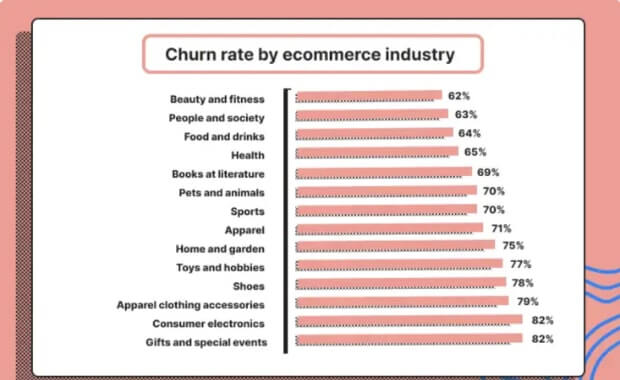
Even worse, eCommerce companies with less than $1 million in revenue don’t invest in customer loyalty. These are worrying stats for eCommerce business owners.
Solution:
To improve customer satisfaction, build a strategy to reduce customer churn. Some of the strategies that can help you improve customer retention are:
- Target the right audience from the start
- Offer a personalized customer onboarding process
- Provide excellent customer service
- Create delightful customer experiences
- Keep a close tab on your competition
- Invest in good customer support and customer success
- Run user feedback surveys to understand customer expectations
- Offer your customers flexible payment options
When your customers are happy, they will come back for more and refer your brand to more people in their network.
Challenge #4: Managing Product Returns and Refunds
One of the biggest problems an online retailer faces is managing returns and refunds. If you have a generous returns policy, you’ll have fickle buyers exploiting the policy. And it’ll cut into your profits.
But not having a returns and refunds policy in place is a bigger challenge. Research says that 86% of consumers check a retailer’s return policy before buying.
It’s also true that 72% of people are likely to buy from brands again if they have a hassle-free return experience.
Clearly-stated return and refund policies are important to customers.
Amazon, Nordstrom, and Costco are brands that offer a seamless return experience. Their policies assure potential customers that they can return their orders if needed.
Solution:
Never hide your return policy or make it tricky for online shoppers to find. Make your returns and refunds policy simple and easy to find in the checkout process.
Nordstrom uses a website notification bar to let customers know of its return policy. You can also include the policy in the frequently asked questions (FAQs) section of your website.

Make sure you set the right expectations if you don’t accept refunds or returns after a specific number of days. When you do it right, you can win loyal customers with your refund process.
Challenge #5: Pricing Products and Managing Shipping Costs
Shopify’s report published in 2022 found that pricing impacts 74% of consumers.
But despite the growth in eCommerce sales, only 12% of brands have a winning pricing strategy. Most eCommerce sites price products based on their operational costs, competitors, or guesswork.
This isn’t sustainable in the long term and can hurt your profits. To improve your product pricing, you have to consider factors like brand positioning, inflation, and location.
But the challenges in growing eCommerce don’t stop at pricing your products. Shipping and inventory management are other sides of growing an eCommerce platform.
Shipping is a tricky affair because it incurs costs for both, you and your customer base. If you offer low-price shipping, it’ll eat into your profits. And if you price it too high, it’ll turn away online shoppers.
Unlike smaller eCommerce companies, retailers like Amazon sell products for a competitive price. They also offer free shipping because they have an efficient supply chain network of their own.
Take, for example, Fulfillment by Amazon (FBA). It’s a program by Amazon that lets its sellers outsource their shipping duties to Amazon.
Amazon’s free shipping doesn’t hurt its profits as much because of its own supply chain network. When a buyer places an order from an Amazon seller, FBA ships orders from the closest facilities.
But if you run a smaller business, how can you manage your pricing and shipping costs?
Solution:
The first step to fixing your pricing challenges is to come up with a good pricing strategy. You can use automated competitor price-tracking software like Prisync to monitor your competitors.
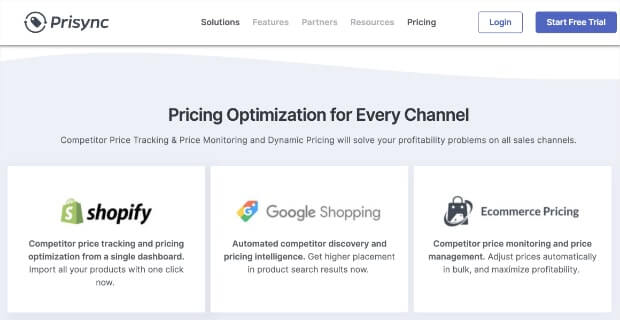
Use promotions in your eCommerce sales to improve conversion rate and increase sales. Holiday discounts, coupon marketing, and bundle pricing help you improve your profit optimization.
Want to master the nuances of pricing your products? Here are some posts for you to dig deeper into the topic:
- How to Price a Product in 6 Easy Steps: A Guide for Beginners
- 20 Pricing Page Best Practices That Will Increase Your Sales
- How to Create a Price Calculator for Your Website
- How to Add Wholesale Pricing in WooCommerce (Step by Step)
- How to Grow Pricing Page Conversions by 30% Today
When it comes to keeping your shipping costs low, look beyond big-name carriers like FedEx or UPS. Forge partnerships with local courier companies to deliver products at a competitive rate.
Apps like Roadie provide low-cost door-to-door delivery for just about anything. As a UPS subsidiary, Roadie’s delivery options are as good as any major courier company.
If your eCommerce runs on WooCommerce, use the WooCommerce Shipping plugin. It lets you print USPS and DHL labels right from the WooCommerce dashboard. It also shows shipping rates live on your online store, saving you time and money.
Challenge #6: Hiring the Right Talent
Most fast-growing eCommerce brands face the unique challenge of hiring the right talent when they need them.
The world saw a huge surge in eCommerce businesses after the COVID-19 pandemic. This has led to an unprecedented labor shortage in eCommerce.
For instance, the eCommerce industry has the second biggest challenge in recruiting in the UK at present. This is representative of the acute labor challenge in the eCommerce sector globally.
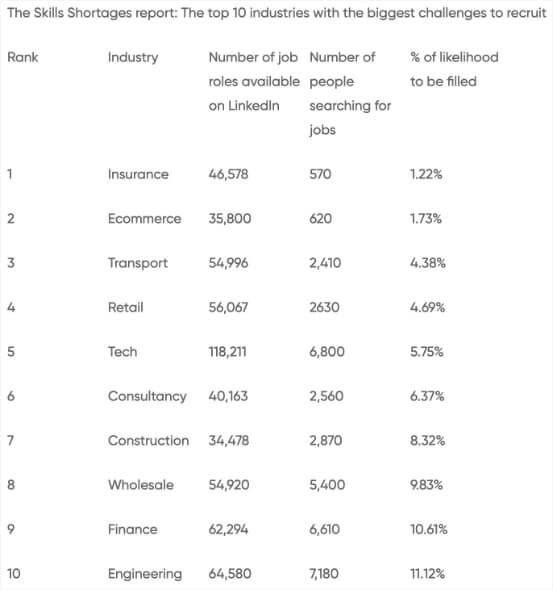
When your business is growing at a healthy pace, it’s important to have the right people in the right roles. The right people can set up new processes and bring stability to your operations.
Solution:
If you’re facing problems in hiring the right talent, know that this is a common challenge across the board. Luckily, there are many potential solutions to overcome this challenge.
If your budget allows, rethink your hiring strategy. Look for top talents in your industry and offer them competitive salaries.
But if you’re a smaller eCommerce brand with a limited hiring budget, you can use automation for day-to-day recurring processes. Use AI-based chatbots to provide instant customer service and cut overheads.
Automating your operations also helps you cushion against talent shortages in the future.
Another great way to handle the talent shortage is to hire independent consultants. In most cases, hiring contractors costs you way less than paying a full-time employee.
Many small businesses also outsource their operations to specialized eCommerce agencies. These agencies offer end-to-end services like website design, app development, and digital marketing.
Challenge #7: Growing Your eCommerce Business
Although most challenges of eCommerce hinder the pace of growth, not all of them are bad. When your business grows, you’ll likely come across problems like taking it to the next level.
These are good challenges, and they need you to think creatively.
The barrier to starting an eCommerce store is at its lowest right now. It has attracted a lot of competition in the industry. This means you can’t take your brand to the next level if you aren’t investing in branding and marketing.
Similarly, your business is as good as a new eCommerce brand if you don’t build an audience or a community. You need to engage with your target audience and offer them incentives to stay loyal to your brands.
Solution:
To take your eCommerce brand to new heights, start thinking about your business as a brand entity. Don’t just run it like a money-making machine.
To grow your brand to its full potential, invest in search engine optimization (SEO). Publish high-quality content for your ideal customers to find you online.
Here are 3 easy ways to start building an enviable brand for your eCommerce business:
You’ll need reliable tools to succeed with these brand-building initiatives. We recommend the following tools to ensure steady growth:
- AIOSEO to get more people to visit your website
- OptinMonster to convert visitors into leads
- TrustPulse to enhance your website’s credibility
- Smash Balloon to grow your social media following
You don’t have to invest thousands of dollars each month to use these tools. These tools are affordable and easy to get started with, even if you haven’t used them before.
Start using these tools to improve your omnichannel marketing strategy. Soon enough, it will help you stand out from the generic brands in your niche.
These experiments will help you attract new customers and keep the existing ones. Over time, this results in improved sales without the need to invest heavily in ads and marketing.
Overcome the eCommerce Challenges to Rise Above the Rest
Tackling the eCommerce growth challenges that we discussed in this post needs a holistic approach. From fighting online fraud to growing your business to its full potential, you need to come up with innovative ways to overcome these eCommerce challenges.
If you can adapt to the ever-changing dynamics in eCommerce, you’ll achieve sustained growth for your business.
Interested in learning more about how to grow your eCommerce business? Here are a few resources to help you in your journey:
- 15 eCommerce Marketing Ideas to Grow Your Online Sales
- 36 Global eCommerce Statistics To Pay Attention
- 13+ Power Hacks To Grow Your Business Online
- eCommerce Best Practices: Set up Your Business for Success
- eCommerce Conversion Rate: Benchmarks & Insights
If you want to start by improving the conversion rate on your eCommerce store, get started with OptinMonster. Unlock your brand’s revenue potential by reducing cart abandonment and increasing sales.

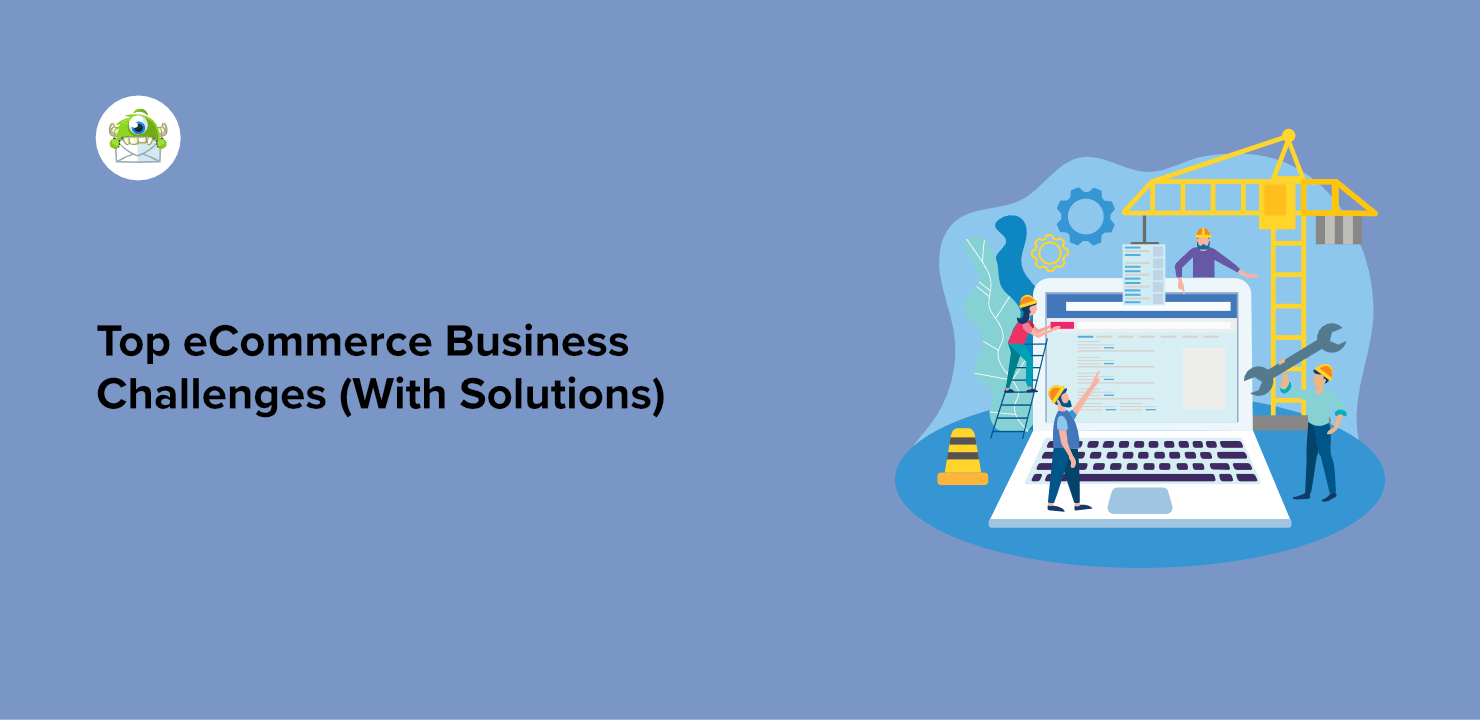
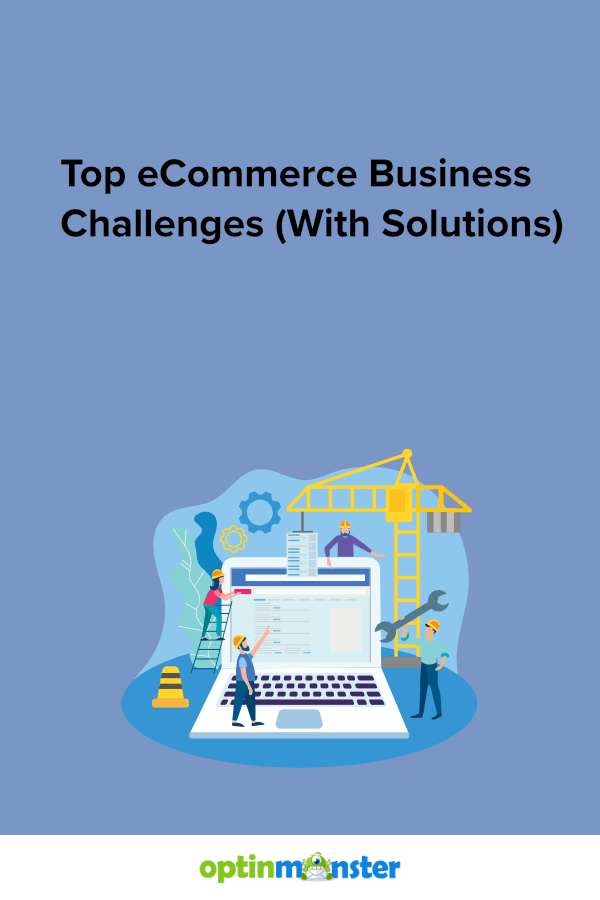




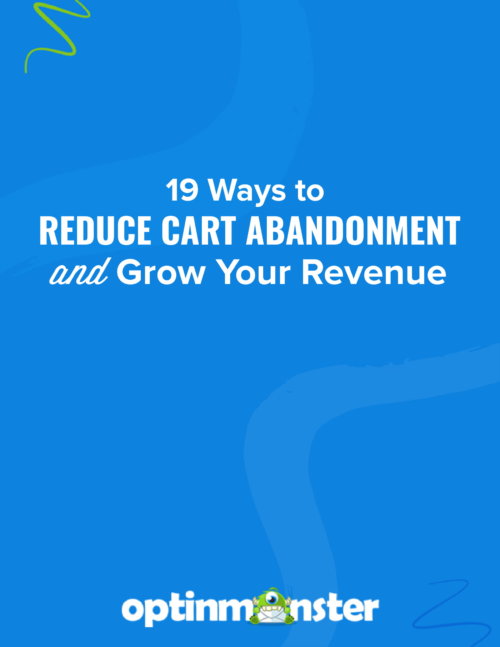



Add a Comment